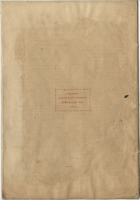Search the Special Collections and Archives Portal
Search Results

Valorie Vega interview, November 19, 2018: transcript
Date
Archival Collection
Description
Interviewed by Laurents Bañuelos-Benitez. Barbara Tabach also participates in the questioning. Valorie J Vega was born in raised in Los Angeles County. Her father, Fred Vega, was one of the first firefighters hired in the Los Angeles County area. Vega was one of three children, and remembers spending her childhood surrounded by family. In college, Vega began studying biology only to realize that she was better suited studying Spanish. Upon completion of her undergrad, Vega went on to earn a Master's in Spanish interpretation. As a result of her studies, Vega was able to secure a job in the Court Interpreter program in Las Vegas, moving here in 1978. Her position in the interpreter program, led her to pursue a degree in law which in turn led to a successful career as a lawyer and a judge.
Text

Floyd Jenne interview, 1996: transcript
Date
Archival Collection
Description
Jenne discusses his birth in Ogden, Utah in 1915, his early life in Northern Nevada in 1920s, and his later life in Boulder City, Nevada working as a reclamation ranger for the Bureau of Reclamation. Jenne begins the interviews discussing his work as a steel foundry worker and miner in McGill, Nevada, studying forestry, and enlisting in the Civilian Conservation Corps at Utah State University in 1934. Jenne then describes his experiences moving to Boulder City and working as a reclamation ranger. Other topics Jenne covers include providing security for notable Boulder City and Hoover Dam (Boulder Dam) visitors and patrolling the area. Lastly, Jeanne talks about the Boulder City Junior Chamber of Commerce, Boulder City's incorporation, and Boulder City law enforcement.
Text

Transcript of interview with Charlene Herst by Barbara Tabach, September 09, 2016
Date
Archival Collection
Description
In 2014, Charlene, n?e Friedkin, Herst retired from her state government career, settled into volunteer work, being a mother and grandmother, and being a grant writer for others. After thirteen years in Carson City, she came back home to Las Vegas. Charlene was eight years old when her parents, Patricia and Richard Friedkin, moved their family to Las Vegas from northern California. She remembers vividly the hot day that they arrived and moved into a rental house in the desert across from Woodlawn Cemetery. Her father, formerly in the grocery business, found work at Vegas Village. Two years later they moved ?into Las Vegas at the very edge?which was Oakey.? She recalls people she has known since those first years who have been instrumental in the growth of Las Vegas; the challenges of being a divorced single mother of four; and the career path that began with an invitation from Gene Greenberg to apply for a part time position at Channel 3, where he was sales manager. At Channel 3 she quickly went from part time to full-time. She started the Community Projects Board, which brought together nonprofit organizations together at the studio in the 1980s to identify and develop marketing campaigns that addressed social issues in the community. Initiatives included Baby Your Baby and Smoking Stinks. While working for Channel 3, she also attended UNLV and received a communications degree in 1995. In 1997 she worked at Sierra Health Services in public relations. Then in October 2001, Charlene started her career in state government as the Nevada State Health Division?s Manager of the Tobacco Program. Over the course of her thirteen year career with the state, she was promoted to positions that continued her dedication to improving the quality of life of all Nevadans. She was instrumental in the implementation of the Nevada Clean Indoor Air Act (2006); improving prevention services to women; reducing the rate of substance use and abuse in the state. The date of her retirement, October 10, 2014, was officially proclaimed in honor of Charlene Herst by Governor Brian Sandoval.
Text

Interview with Raymond Chester Harbert, April 3, 2006
Date
Archival Collection
Description
Text

Interview with Anna (Anne) Welsh, June 23, 2004
Date
Archival Collection
Description
Text
Urban Chamber of Commerce of Las Vegas, Nevada Records
Identifier
Abstract
The Urban Chamber of Commerce of Las Vegas, Nevada Records date from approximately 1980 to 2009 and contains the organizational records of the Urban Chamber of Commerce of Las Vegas, Nevada (UCC), one of the many chambers of commerce in the Las Vegas, Nevada area. The mission of the Urban Chamber of Commerce is to create and foster an environment that promotes development of members and Black-owned businesses. The collection is comprised of publications, financial and administrative records, various event information, and photographs of events and membership.
Archival Collection
Equal Rights Nevada Collection
Identifier
Abstract
The Equal Rights Nevada (2000-2002) collection is comprised of organizational records documenting the group’s unsuccessful fight against Question 2, a referendum voted upon in 2000 and 2002 to amend Nevada’s state constitution to forbid same-sex marriage. It includes campaign files, financial records, publicity, correspondence, ephemera, and other supporting documentation from national and regional marriage equality organizations.
Archival Collection
Greenpeace Pacific Southwest Records
Identifier
Abstract
The Greenpeace Pacific Southwest Records are comprised of files and documents pertaining to environmental activism in Southern Nevada from 1962 to 1994, primarily addressing the organization of protests at the Nevada Test Site. The collection contains newspaper articles, newsletters, publications, financial records, protest information, correspondence, meeting minutes, articles of incorporation, Freedom of Information Act requests, and Nevada Test Site information. Also contained in the collection are maps and documents related to various environmental issues such as nuclear waste, land use, wildlife protection, and international environmental activism.
Archival Collection

